
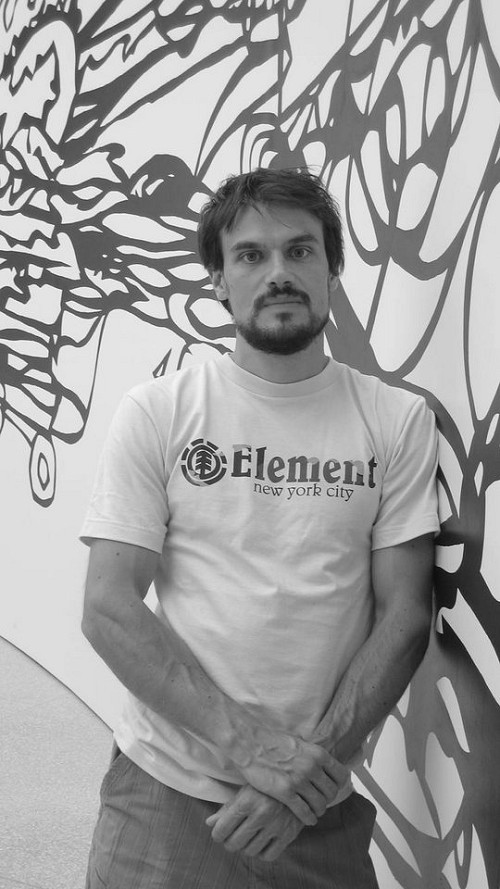
Chances are, you have never heard of Patrick Matros and have no idea why an interview with him would be even remotely interesting to you.
But if I say he is the coach of Alexander Megos, one of the, if not THE, brightest shining new star(s) in the world of Sport climbing things are beginning to make a little more sense.
Who is Patrick Matros?
Hi there, I'm 39 years old and currently working at the University of Erlangen-Nürnberg (Institute for educational science). Climbing and Bouldering are my favorite sports, but I like also le parkour/freerunning, nordic skiing, snowboarding and hiking.
Can you tell me a little bit about your climbing career and how it lead to you becoming a coach.
I started climbing at the age of 18. For us it was like an adventure and things like abseiling, building tyrolean bridges, hiking in the mountains and camping outside in the nature were pretty important to get the "whole feeling" of it.
At a certain point I decided to test my limits in this sport. Maybe based on some sports like gymnastics, which I was practicing performance oriented in the past. My goals were to climb 8b+ and boulder 8A+. Not very special for today's standards, but for me then it was a real challenge.
Finally I could raise the bar a little bit higher and snatched an 8c, which I thought was impossible when I started to climb. One of my highlights was the first ascent of the route Archon (8b), which has to be protected only with removable gear.
I focused more on rockclimbing instead of competitions, although I took part in comps up to national level. All the time I was motivated to share my experience and impart it to young and motivated athletes. I started with a local training group in my mountaineering club and now my partner Dicki Korb and I are coaches at the federal center of sportclimbing/bouldering in Erlangen/Nuremberg.
Is this something you do full time?
No, I have a full time job as scientist and university lecturer.
How many climbers are you coaching right now?
We coach 4 athletes at the federal center and another 8 athletes on regional level.
Do you have any special philosophy when it comes to training?
To have a certain philosophy based on the idea of human development and relationships, for me is the most important thing for a good trainer/coach.
Human interaction and communication is based on relationships. Under this perspective the athlete has to be a human being, not a technical object, which has to be prepared. We try to consider not only the performance parameters, but also the general attitude of the athlete, his social environment, his parents and things which are important for him besides the sport.
Our overall goals are:
- Maintain a joyful attitude towards the sport, even when it isn't practiced performance oriented anymore.
- Help the athlete to get more and more self dependent
- Prevent the athlete form injuries and harm due to wrong training
- Support the development of the athlete's personality in a positive way
How long have you been coaching Alexander Megos?
We started to work with Alexander when he was at the age of 13, so we are in our 6th year.
Did you realize from the start he was something out of the ordinary? If so, in what ways was he different?
Yes, we were realizing that pretty early. Alexander had an extraordinary strength endurance and an astonishing kinesthesia. After a while you also could see his long term motivation and volition which are both very important factors for peak performance.
What is the goal of your cooperation? Is this something that has changed much over time? If so, how and why?
If you are lucky to work together with an athlete like Alexander, the first thing is to reflect on your role as a trainer. You can make pretty many mistakes!
One of the biggest is to want everything and very fast. Success makes blind sometimes. This certain form of thinking can affect both trainer and athlete. Often a dropout is the consequence.
In my opinion the athlete has to "grow" physically and mentally. This also can mean that I have to slow down the process a little bit and give all factors of performance a chance to keep up with the development. Another problem is performance barriers. There's strong evidence that a fast and biased development of performance is leading to earlier stagnation.
So we developed Alexander's training routines step by step which might be one of the reasons that he remained under the radar of the climbing community. Another aspect is his humble character.
Due to our philosophy our cooperation has changed over time. The focus on training routines more and more changed into something like coaching and recently managing.
Concerning his training, Alexander meanwhile knows pretty well what to do, we focus on exploring weaknesses and introducing new methods we get to know.
Concerning coaching aspects, a key moment for Alexander was to get a year off in order to travel and climb. Recently the most demanding things are managing activities to enable Alexander to focus on what he does best: Climbing.
To what extent do you think the current level of climbing influences what can be achieved?
On the one hand it's this mental aspect, which I need to know that something is possible. I remember this when it comes to boulders like Jade or Mandala. First they have the nimbus of something nearly impossible. After a while and a few repeats, they lose their nimbus, though they are still pretty hard.
On the other hand, the sport needs visionary characters that push the limit. Johnny Dawes, Wolfgang Güllich, Chris Sharma, Beat Kammerlander, Alexander Huber and Adam Ondra are persons who lifted the sport on a higher level in their special way.
So it's the coincidence of a certain level, which rises step by step and pioneers who take the step beyond. 9a+ will be flashed within a few years, no doubt.
Another often discussed problem is the latent inflation of grades. Are people nowadays climbing so much harder than five or ten years ago? In Frankenjura for example, you can notice that old school 8c's like Wallstreet or Showdown have only a few repeats per year compared to others, which were opened later on.
I took Alexander to our benchmark boulder problem Gossip, 8C, (established 2002 and formerly graded with 8B+) and he said it is damned hard. I won't generalize this aspect, but for me Dave Graham's proclamation of the 8C standard of boulder difficulty with his first ascent of The story of two worlds and Adam Ondra's very honest personal (down-) gradings were signals in the right direction.
Do you think Alexander would still have onsighted 9a if he would have been born 10 years earlier?
Well it is hardly possible to answer that. But never say never :)
Do you see any limit to what is possible?
Limits? I know some future projects in FJ :)
For short boulder problems we come closer, because there are physical limits (unfortunately I'm not a physicist). For modern top routes which combine hard boulder problems with stamina and no rests in between, I think the evolution hasn't stopped yet. And it's the same with boulder problems that demand stamina for app. 10-15 moves.
Besides that, I hope that doping will not be the factor to push the sport forward in future.
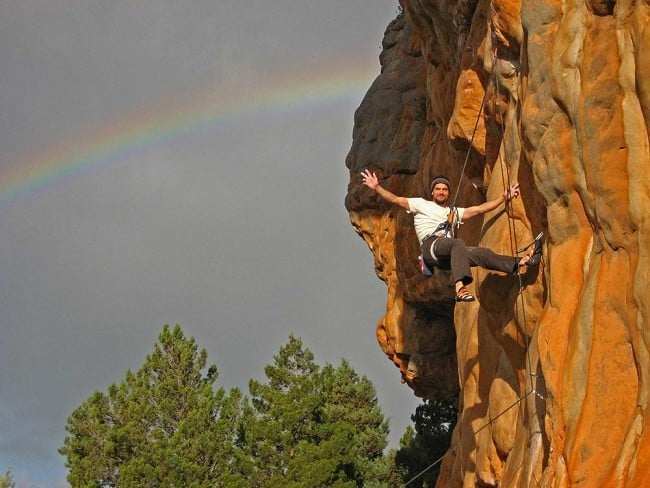
Is Alexander planning to compete this season?
It's not intended, maybe one or two competitions.
Is there a conflict between training for rock and training for competition? If so, why?
It's hard to generalize. There are climbers who compete in the World Cup and climb only 8b on rock as they focus nearly completely on plastic. Others like recent Boulder WC winner Jan Hoyer spend a lot of their time outside and step constantly on the winner's rostrum.
Some athletes can switch easily between plastic and rock, some have problems with it in both directions. Some athletes get themselves refueled with motivation when climbing outside, others don't need that. Some climbers like to be under pressure, to compete against each other and perform at their best exactly under the circumstances of a competition. I think this is the most important thing for good results in competitions and you have to train that as well, if you want to be successful. If you don't like that, better don't compete. You will have no fun with it. On the other hand I think a good competitor will profit from practicing both forms: rock and plastic.
In the future, do you think we will see more specialization than now?
It depends on the style of climbing which is demanded in bouldering and lead contests. There are always specialists, but the recent development fosters no specialization because of more and more bouldery and athletic lead routes.
Under those circumstances my opinion is that we will see no more specialization than now. Things change, if boulders start to become more artistic and there would be a revival of those endless and monotonous lead routes.
10 years from now. How has climbing changed, if at all?
Well, there will be more performance oriented climbers. More talented persons will get into the sport and so performance is going to rise. Of course, difficulty will rise, too.
Climbing is going to get a more professional sport. Combined with that, the complexity will rise. More athletes will need partners to market and manage themselves. If climbing gets into the Olympic Games, even more professionalism will take place, with negative and positive aspects for the sport.
Countries, which nowadays are blank spots on the climbing map, are going to join competitions like the World Cup and the World Championships. Again there will be an upswing for performance oriented training in the youth sector and associations have to deal with it.
You are planning to release a training DVD in the autumn of 2013, can you tell me a little about that?
Yes! We decided to give some detailed descriptions about one of our main goals: Prevention of injuries. Therefore we developed exercises for balanced strength training in sportclimbing. Our opinion is, that you should train your antagonists in a complex and intensive way to develop balanced and functional working muscles.
Together with my counterpart Ludwig (Dicki) Korb and Hannes Huch (professional film maker and owner of a bouldering gym) we work on a DVD project including a booklet with detailed descriptions. You will also find specific exercises for climbing in it.
Last but not least we invited some top climbers and asked them about training. As a bonus, you can see some training footage of Wolfgang Güllich, commented by his former professor and coach. All this will be available not only in German, but also in English language.
More information under Gimme Kraft
Thanks a lot Patrick!

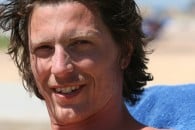



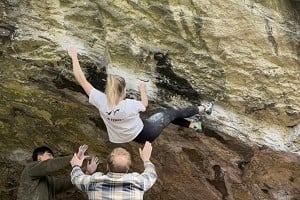
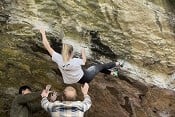
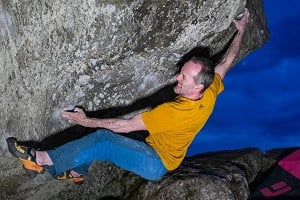
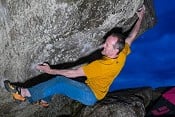
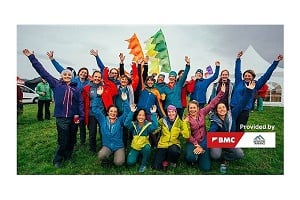
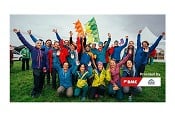
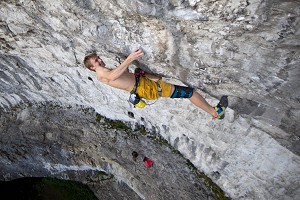
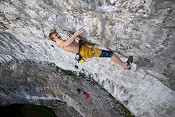
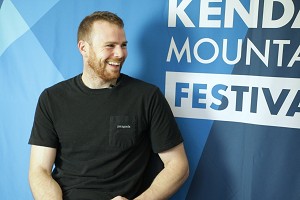
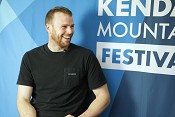
Comments